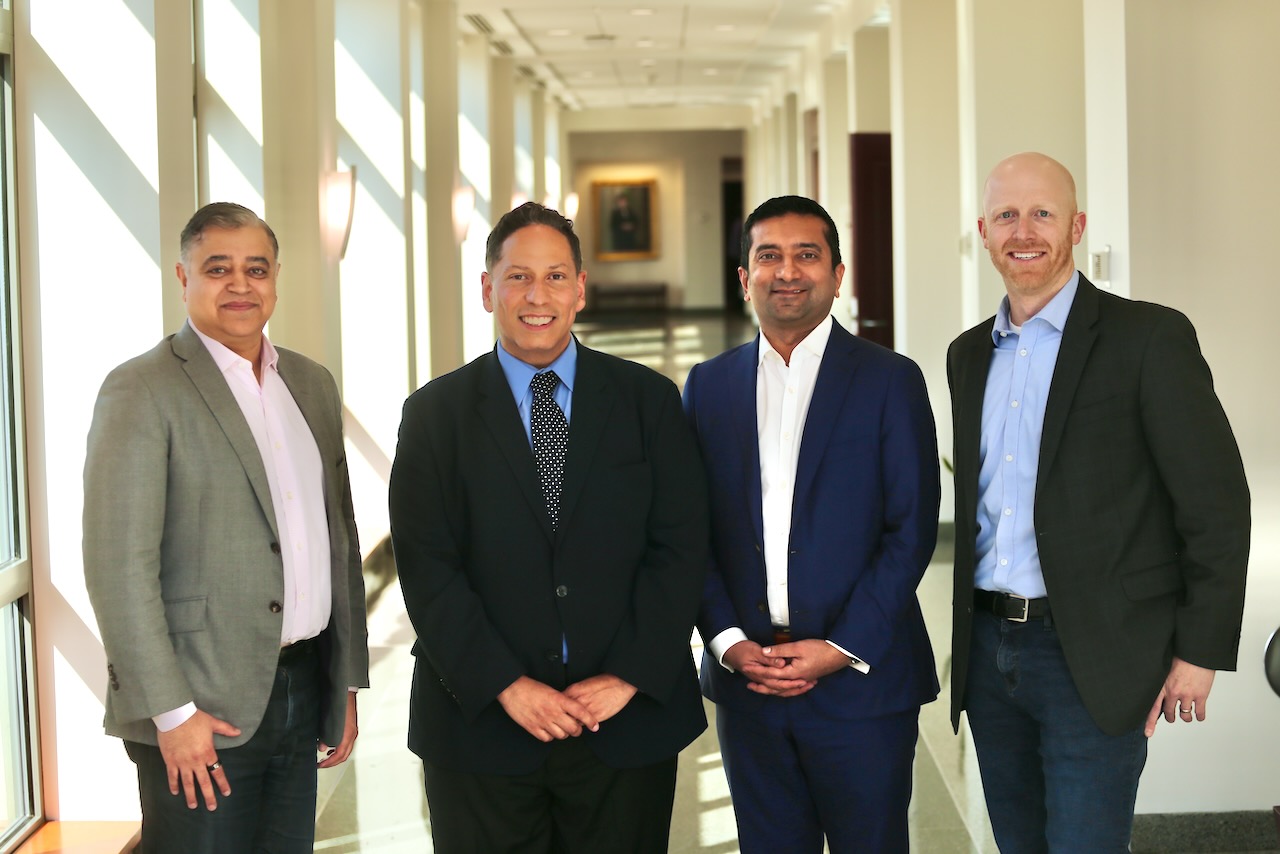School of Nursing Distinguished Lecture Focused on the Need to Envision Healthcare Differently to Shift the Costs of Health Inequities
More than 400 individuals joined the hybrid 2023 Harriet Cook Lecture that featured guest speakers: Dr. Jay Bhatt, Andy Davis, and Neal Batra from Deloitte’s Center for Health Solutions and Health Equity Institute, and Dean Vincent Guilamo-Ramos.

As the School of Nursing embarks on its five-year strategic plan with a focus on advancing health equity and social justice, this year’s lecture highlighted the growing and increasingly unsustainable human and financial costs that are widening health inequities in the United States.
Neal Batra, future of health lead, Deloitte Consulting LLP, said when fragmentation moments occur in the healthcare system like costs inequities, there is opportunity to reassemble the framework. He mentioned that any organization must understand the “age of biology” going beyond sick care to establishing overall patient wellness. “Is this a more equitable world, technology supports making it more equitable because it allows opportunity to close equity gaps, that may extend from distance issues for patients who do not live near clinics and it can address literacy issues,” Batra said.
“Is this a more equitable world, technology supports making it more equitable because it allows opportunity to close equity gaps, that may extend from distance issues for patients who do not live near clinics and it can address literacy issues.”
Neal Batra
The traditional task of nursing was categorized as a sick care service but Batra said it is Deloitte’s observation that healthcare activity shifts nurses to take on a new role of facilitating self-engagement, avoiding illness, and promoting wellness. “DUSON efforts are important because it is a need from the education side to influence healthcare providers going from sick care to well care.” Deloitte estimates the cost of inequities will grow from $320B to $1T in 2040.
Andy Davis, FSA, MAAA, future of health leader & actuarial practice lead, Deloitte Consulting LLP, said healthcare organizations spend time across four categories: restoring health, promoting health, treating sickness, and delaying symptoms (keeping someone at a stable level of health). “Why do you care today, in 2030, we see the restoring health category triple, which is the role of patients getting in front of disease and getting back to health. In 2040, patients will become customers that we strive to help keep away from disease and they become more engaged in their health.”
Davis mentioned, if cost inequities continue to rise, it will continue to bridge the gap between affordable healthcare and access to care. According to Deloitte Center for Health Solutions, addressing health disparities can decrease healthcare spending. Davis spoke about the current trajectory based on the current Centers for Medicare and Medicaid Services National Health Expenditure projections that healthcare expenditures will trend at 5.3 percent.
Jay Bhatt, D.O., MPH, MPA, executive director, Deloitte Center for Health Solutions & Deloitte Health Equity Institute, said health equity means fair and opportunity for people to achieve full human potential in health and wellbeing aspects mentally, socially, emotionally, physically, and spiritual health. “Our research found we must use this framework: be intentional, form cross-sector partnerships, measure progress, address individual and community-level barriers, and build trust,” Bhatt said. “It is critical clinicians are aware of the biases we deliver. A transparency report can put into perspective the healthcare systems’ recruitment efforts, services, product types, health status of patients served, and what algorithms and data are in place to access potential biases.”
Batt concluded that the best action to take is to address the root causes of health inequity and come up with solid business solutions.
Vincent Guilamo-Ramos, PhD, MPH, LCSW, RN, ANP-BC, PMHNP-BC, FAAN, DUSON dean, and vice-chancellor, nursing affairs, Duke University, concluded the discussion with reiterating climate change, structural racism, substance abuse, pandemics, housing are only a few factors attributing to health inequities. “Nurses, a highly-skilled and the largest segment of the overall healthcare workforce, hold the key to the future of healthcare profession,” Ramos said.
"Nurses, a highly-skilled and the largest segment of the overall healthcare workforce, hold the key to the future of healthcare profession."
Vincent Guilamo-Ramos
He continued with nurses must embrace their gift and accept the challenge to fight health inequity. Along the health continuum nurses’ work is to emphasize health promotion and disease prevention. “We should think about interventions and tools to litigate that interjection to prevent patients getting to the point of terminal illness and take care of the issue before it even starts,” Ramos said. “DUSON has implemented a new mission, new tools, and new faculty members to shift the paradigm in health inequities.”